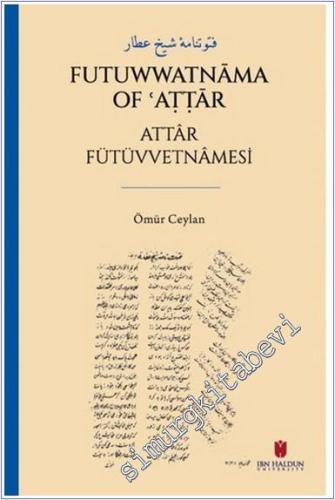#smrgKİTABEVİ Futuwwatnama of Attar = Attâr Fütüvvetnâmesi - 2024
Editör:
Kondisyon:
Yeni
Sunuş / Önsöz / Sonsöz / Giriş:
Dizi Adı:
ISBN-10:
6256491632
Kargoya Teslim Süresi (İş Günü):
4&6
Hazırlayan:
Cilt:
Amerikan Cilt
Boyut:
16x24
Sayfa Sayısı:
208
Basım Yeri:
İstanbul
Baskı:
1
Basım Tarihi:
2024
Kapak Türü:
Karton Kapak
Kağıt Türü:
Enso
Dili:
İngilizce
Kategori:
indirimli
240,00
Havale/EFT ile:
235,20
Siparişiniz 4&6 iş günü arasında kargoda
1199234449
621385

https://www.simurgkitabevi.com/futuwwatnama-of-attar-attar-futuvvetnamesi-2024
Futuwwatnama of Attar = Attâr Fütüvvetnâmesi - 2024 #smrgKİTABEVİ
240.00
Futuwwatnames can be said to be the historical lawbooks of futuwwa teaching, which was written in Arabic, Persian, and Turkish prose and poetry. The character portrait of fata (member of futuwwa) is drawn reasonably with these rules of adab. Futuwwatnames arrange the daily behaviours of a model person that they draw. They tell rules of etiquette from sitting and standing to table manners, from walking around the shopping district to grave visits elaborately. Farid al-Din Attar, who lived between the XII-XIII centuries, is one of the artists accepted by all Sufist schools and cults and succeeded in protecting his fame and influence along centuries with so many works he left behind. While the discussions on which works attributed to his name belong to him goes on, the worldview he put into words in his works, the age he lived in, and his view on Sufism strengthen the idea of ‘Attar's probability of writing a futuwwa. This study contains the last 100 couplets and their Turkish translation from the manuscript registered under the number F. 1288 in the Persian Manuscripts section of Istanbul University Library. In our opinion, there is a high likelihood that a portion of these couplets belongs to ‘Attar.
Futuwwatnames can be said to be the historical lawbooks of futuwwa teaching, which was written in Arabic, Persian, and Turkish prose and poetry. The character portrait of fata (member of futuwwa) is drawn reasonably with these rules of adab. Futuwwatnames arrange the daily behaviours of a model person that they draw. They tell rules of etiquette from sitting and standing to table manners, from walking around the shopping district to grave visits elaborately. Farid al-Din Attar, who lived between the XII-XIII centuries, is one of the artists accepted by all Sufist schools and cults and succeeded in protecting his fame and influence along centuries with so many works he left behind. While the discussions on which works attributed to his name belong to him goes on, the worldview he put into words in his works, the age he lived in, and his view on Sufism strengthen the idea of ‘Attar's probability of writing a futuwwa. This study contains the last 100 couplets and their Turkish translation from the manuscript registered under the number F. 1288 in the Persian Manuscripts section of Istanbul University Library. In our opinion, there is a high likelihood that a portion of these couplets belongs to ‘Attar.
Yorum yaz
Bu kitabı henüz kimse eleştirmemiş.

























